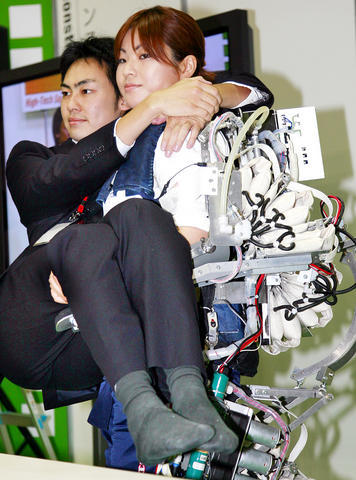If you grow old in Japan, expect to be served by a feeding robot, ride a voice-recognition wheelchair and hire a nurse in a robotic suit -- all examples of cutting-edge technology to care for the country's rapidly graying population.
With nearly 22 percent of Japan's population already aged 65 or older, businesses here have been rolling out everything from easy-entry cars to remote-controlled beds, fueling a care technology market worth some ¥126 billion (US$1 billion) last year, industry figures showed.
At a home care and rehabilitation convention in Tokyo last week, buyers crowded around a demonstration of Secom Co's My Spoon feeding robot, which helps elderly or disabled people eat with a spoon and fork-fitted swiveling arm.

PHOTO: AFP
Operating a joystick with his chin, developer Shigehisa Kobayashi maneuvered the arm toward a block of silken tofu, deftly getting the fork to break off a bite-sized piece. The arm then returned to a preprogrammed position in front of the mouth, allowing Kobayashi to bite and swallow.
"It's all about empowering people to help themselves," Kobayashi said. The Tokyo-based company has already sold 300 of the robots, which come with a price tag of ?408,100.
"We want to give the elderly control over their own lives," he said.
The rapidly aging population here has spurred a spate of concerns: a labor shortage, tax shortfalls, financial difficulties in paying the health bills and pensions of large numbers of elderly.
Moreover, a breakdown of family ties in recent years means a growing number of older Japanese are spending their golden years away from the care traditionally provided by children and grandchildren.
That's where cutting-edge technology steps in.
A rubber and nylon "muscle suit" developed by the Tokyo University of Science helps keep the elderly active by providing support for the upper body, arms and shoulders.
Powered by air pressure actuators, the prototype suit -- which looks like an oversized life jacket -- provides subtle backing to help older people lift heavy objects.
The intelligent wheelchair TAO Aicle from Fujitsu Ltd and Aisin Seiki Co uses a positioning system to automatically travel to a preset destination, and uses sensors to detect and stop at red lights and to avoid obstacles.
Another wheelchair designed by the National Institute of Advanced Industrial Science and Technology responds to oral commands like "forward" and "back," "right" and "left."
Then there are cars designed for easy entry for the wheelchair-bound or those with difficulty walking, like Toyota Motor Corp's Welcab series. Its slogan: "A car that's more patient than your daughter."
There's help for caregivers, too.
A full-body robotic suit developed by the Kanagawa Institute of Technology is a massive contraption powered by 22 air pumps to help nurses hoist patients on and off their beds.
Sensors attached to the user's skin detects when muscles are trying to lift something heavy -- and signals to the air pumps to kick in to provide support.
Though the suit makes its wearer look a little like Robocop, a student who was easily lifted off a table in a demonstration said he felt comfortable during the test.
"It doesn't feel at all like I'm being lifted by a robot," he said.

Quanta Computer Inc (廣達) chairman Barry Lam (林百里) is expected to share his views about the artificial intelligence (AI) industry’s prospects during his speech at the company’s 37th anniversary ceremony, as AI servers have become a new growth engine for the equipment manufacturing service provider. Lam’s speech is much anticipated, as Quanta has risen as one of the world’s major AI server suppliers. The company reported a 30 percent year-on-year growth in consolidated revenue to NT$1.41 trillion (US$43.35 billion) last year, thanks to fast-growing demand for servers, especially those with AI capabilities. The company told investors in November last year that

Taiwanese suppliers to Taiwan Semiconductor Manufacturing Co. (TSMC, 台積電) are expected to follow the contract chipmaker’s step to invest in the US, but their relocation may be seven to eight years away, Minister of Economic Affairs J.W. Kuo (郭智輝) said yesterday. When asked by opposition Chinese Nationalist Party (KMT) Legislator Niu Hsu-ting (牛煦庭) in the legislature about growing concerns that TSMC’s huge investments in the US will prompt its suppliers to follow suit, Kuo said based on the chipmaker’s current limited production volume, it is unlikely to lead its supply chain to go there for now. “Unless TSMC completes its planned six

Intel Corp has named Tasha Chuang (莊蓓瑜) to lead Intel Taiwan in a bid to reinforce relations between the company and its Taiwanese partners. The appointment of Chuang as general manager for Intel Taiwan takes effect on Thursday, the firm said in a statement yesterday. Chuang is to lead her team in Taiwan to pursue product development and sales growth in an effort to reinforce the company’s ties with its partners and clients, Intel said. Chuang was previously in charge of managing Intel’s ties with leading Taiwanese PC brand Asustek Computer Inc (華碩), which included helping Asustek strengthen its global businesses, the company

TikTok abounds with viral videos accusing prestigious brands of secretly manufacturing luxury goods in China so they can be sold at cut prices. However, while these “revelations” are spurious, behind them lurks a well-oiled machine for selling counterfeit goods that is making the most of the confusion surrounding trade tariffs. Chinese content creators who portray themselves as workers or subcontractors in the luxury goods business claim that Beijing has lifted confidentiality clauses on local subcontractors as a way to respond to the huge hike in customs duties imposed on China by US President Donald Trump. They say this Chinese decision, of which Agence